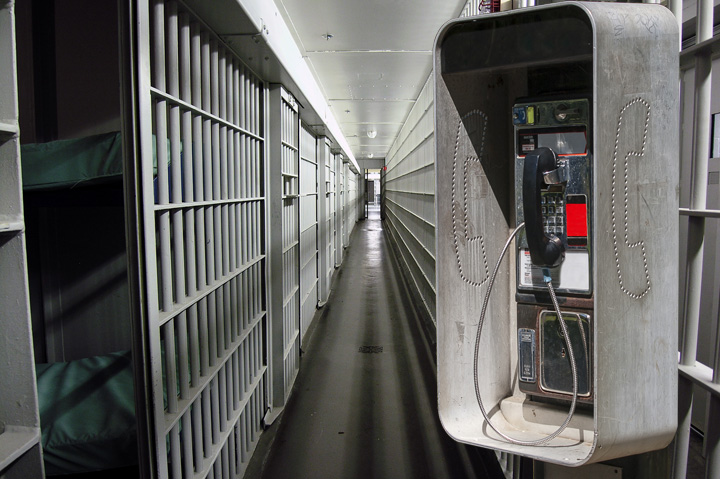Recorded Phone Calls of Pretrial Detainees May Be Used by Prosecutors, NY High Court Rules
Associate Judge Paul Feinman wrote in the court's opinion that allowing those recordings to be sent to, and used by, prosecutors without a warrant or the consent of pretrial detainees does not violate the U.S. Constitution.
February 21, 2019 at 03:27 PM
6 minute read
 Shutterstock, NYLJ
Shutterstock, NYLJ
Phone calls of defendants held in state prison before their trial may be recorded and sent to prosecutors to use against them in court without a warrant, the Court of Appeals said in a decision Thursday.
Associate Judge Paul Feinman wrote in the court's opinion that allowing those recordings to be sent to, and used by, prosecutors without a warrant or the consent of pretrial detainees does not violate the U.S. Constitution, as was alleged by the defendant in the case.
“We hold that detainees, informed of the monitoring and recording of their calls, have no objectively reasonable constitutional expectation of privacy in the content of those calls,” Feinman said. “Thus, a correctional facility may record and monitor detainees' calls, as well as share the recordings with law enforcement officials and prosecutors, without violating the Fourth Amendment.”
The defendant, Emmanuel Diaz, was convicted on burglary and robbery charges in 2014 after the Brooklyn District Attorney's Office used incriminating excerpts in court from four phone calls he made during the eight months he spent on Rikers Island, a New York City prison, before he was able to post bail.
Diaz understood, and was informed, that his phone calls would be monitored and recorded while he was detained before trial. There were signs by the telephones that told inmates as such, a notice in the inmate handbook, and a recording that played whenever a call was made. Diaz made approximately 1,100 phone calls from Rikers before his trial, according to Feinman.
What he was not told, and said he did not consent to, was that those recordings may be sent to prosecutors who were preparing his case for trial in the coming months. He was represented by Dina Zloczower, a staff attorney with Appellate Advocates, which provides legal counsel to low-income defendants.
“The [Brooklyn District Attorney's Office] violated [Diaz's] rights when they obtained recordings of his phone conversations from Rikers with family and friends absent any consent, prison related purpose, or a warrant,” Zloczower argued before the Court of Appeals last month.
She claimed that allowing prosecutors to use those recordings constituted an unlawful search under the Fourth Amendment. Feinman disagreed with that analysis in the court's opinion Thursday.
“Where detainees are aware that their phone calls are being monitored and recorded, all reasonable expectation of privacy in the content of those phone calls is lost,” Feinman wrote. “We therefore reject defendant's argument that he retained a reasonable expectation of privacy once the calls were lawfully intercepted by [the Department of Correction] and hold that there were no additional Fourth Amendment protections that would prevent DOC from releasing the recording to the District Attorney's Office absent a warrant.”
There are exceptions to that rule, Feinman said. Conversations between defendants and their attorneys are not allowed to be recorded, for example. But phone calls between defendants and others are usually free game to be monitored, recorded and used by prosecutors if they help their case. He likened the practice to regular prison sweeps conducted by correctional officers.
“For instance, correctional officers routinely conduct warrantless searches of inmates and their cells to keep other inmates and themselves safe,” Feinman wrote. “The logic underlying the routine monitoring and recording of phone calls is no different.”
Associate Judge Rowan Wilson wrote in a strongly worded dissent that Feinman was wrong to discount the Fourth Amendment's defense of Diaz's case. He argued that since Diaz had not been convicted of anything during those eight months at Rikers, he should have been afforded the same rights as defendants who do not spend time in prison before trial.
“For a criminal defendant who is not detained but is instead out on bail, the Fourth Amendment undoubtedly requires law enforcement to obtain a warrant to monitor that person's calls,” Wilson wrote. “As a pretrial detainee not convicted of any crime at the time the phone recordings at issue in this case were made, Mr. Diaz is, as a starting point, entitled to that same level of constitutional protection.”
Wilson also argued that even if Diaz offered implied consent to have his phone calls monitored and recorded at Rikers, that could not be understood at the time as an agreement for those recordings to be sent and used by prosecutors.
“In other words, Mr. Diaz's consent to a search by DOC, a non-law enforcement governmental entity, for its own security purposes cannot reasonably be construed to include consent for the District Attorney—a law enforcement entity—to search that information for prosecutorial purposes,” Wilson wrote.
As is common for Wilson, he presented his opinion in a different way by using a metaphor for Diaz's case—this time involving a demolition derby and the idea of implied consent.
“Under the majority's construction, if I ask to borrow your car to drive to the corner store, I may enter it into a demolition derby, because I did not say the only thing I was going to use it for was to go to the store,” Wilson said. “You would be shocked if I said you had impliedly consented, and no court would conclude you had impliedly consented to a use fundamentally different from the one I specifically expressed.”
Wilson was joined on the dissent by Associate Justice Jenny Rivera. Chief Judge Janet DiFiore and Associate Judges Leslie Stein, Eugene Fahey, and Michael Garcia concurred with Feinman on the majority opinion.
Zloczower said on Thursday they would be weighing their options after the decision. A spokesman for the Brooklyn District Attorney's Office did not immediately return a request for comment.
READ MORE:
Release Secured by Chevron Doesn't Block New Asbestos Claims, NY Court of Appeals Rules
Sealing Records Not Mandatory for Persons Acquitted on Insanity Pleas, Court of Appeals Rules
Attorney's Violation of NY Home-Office Law Is Curable in Litigation, Court of Appeals Rules
This content has been archived. It is available through our partners, LexisNexis® and Bloomberg Law.
To view this content, please continue to their sites.
Not a Lexis Subscriber?
Subscribe Now
Not a Bloomberg Law Subscriber?
Subscribe Now
NOT FOR REPRINT
© 2025 ALM Global, LLC, All Rights Reserved. Request academic re-use from www.copyright.com. All other uses, submit a request to [email protected]. For more information visit Asset & Logo Licensing.
You Might Like
View All
Alston & Bird Adds M&A, Private Equity Team From McDermott in New York
4 minute read
Weil Lures DOJ Antitrust Lawyer, As Government Lateral Moves Pick Up Before Inauguration Day
5 minute read
Looking to the Future of the FDA and Its Impact on Drug Regulation in 2025
4 minute readTrending Stories
Who Got The Work
J. Brugh Lower of Gibbons has entered an appearance for industrial equipment supplier Devco Corporation in a pending trademark infringement lawsuit. The suit, accusing the defendant of selling knock-off Graco products, was filed Dec. 18 in New Jersey District Court by Rivkin Radler on behalf of Graco Inc. and Graco Minnesota. The case, assigned to U.S. District Judge Zahid N. Quraishi, is 3:24-cv-11294, Graco Inc. et al v. Devco Corporation.
Who Got The Work
Rebecca Maller-Stein and Kent A. Yalowitz of Arnold & Porter Kaye Scholer have entered their appearances for Hanaco Venture Capital and its executives, Lior Prosor and David Frankel, in a pending securities lawsuit. The action, filed on Dec. 24 in New York Southern District Court by Zell, Aron & Co. on behalf of Goldeneye Advisors, accuses the defendants of negligently and fraudulently managing the plaintiff's $1 million investment. The case, assigned to U.S. District Judge Vernon S. Broderick, is 1:24-cv-09918, Goldeneye Advisors, LLC v. Hanaco Venture Capital, Ltd. et al.
Who Got The Work
Attorneys from A&O Shearman has stepped in as defense counsel for Toronto-Dominion Bank and other defendants in a pending securities class action. The suit, filed Dec. 11 in New York Southern District Court by Bleichmar Fonti & Auld, accuses the defendants of concealing the bank's 'pervasive' deficiencies in regards to its compliance with the Bank Secrecy Act and the quality of its anti-money laundering controls. The case, assigned to U.S. District Judge Arun Subramanian, is 1:24-cv-09445, Gonzalez v. The Toronto-Dominion Bank et al.
Who Got The Work
Crown Castle International, a Pennsylvania company providing shared communications infrastructure, has turned to Luke D. Wolf of Gordon Rees Scully Mansukhani to fend off a pending breach-of-contract lawsuit. The court action, filed Nov. 25 in Michigan Eastern District Court by Hooper Hathaway PC on behalf of The Town Residences LLC, accuses Crown Castle of failing to transfer approximately $30,000 in utility payments from T-Mobile in breach of a roof-top lease and assignment agreement. The case, assigned to U.S. District Judge Susan K. Declercq, is 2:24-cv-13131, The Town Residences LLC v. T-Mobile US, Inc. et al.
Who Got The Work
Wilfred P. Coronato and Daniel M. Schwartz of McCarter & English have stepped in as defense counsel to Electrolux Home Products Inc. in a pending product liability lawsuit. The court action, filed Nov. 26 in New York Eastern District Court by Poulos Lopiccolo PC and Nagel Rice LLP on behalf of David Stern, alleges that the defendant's refrigerators’ drawers and shelving repeatedly break and fall apart within months after purchase. The case, assigned to U.S. District Judge Joan M. Azrack, is 2:24-cv-08204, Stern v. Electrolux Home Products, Inc.
Featured Firms
Law Offices of Gary Martin Hays & Associates, P.C.
(470) 294-1674
Law Offices of Mark E. Salomone
(857) 444-6468
Smith & Hassler
(713) 739-1250







